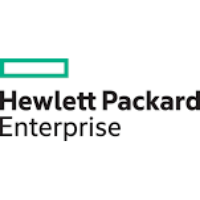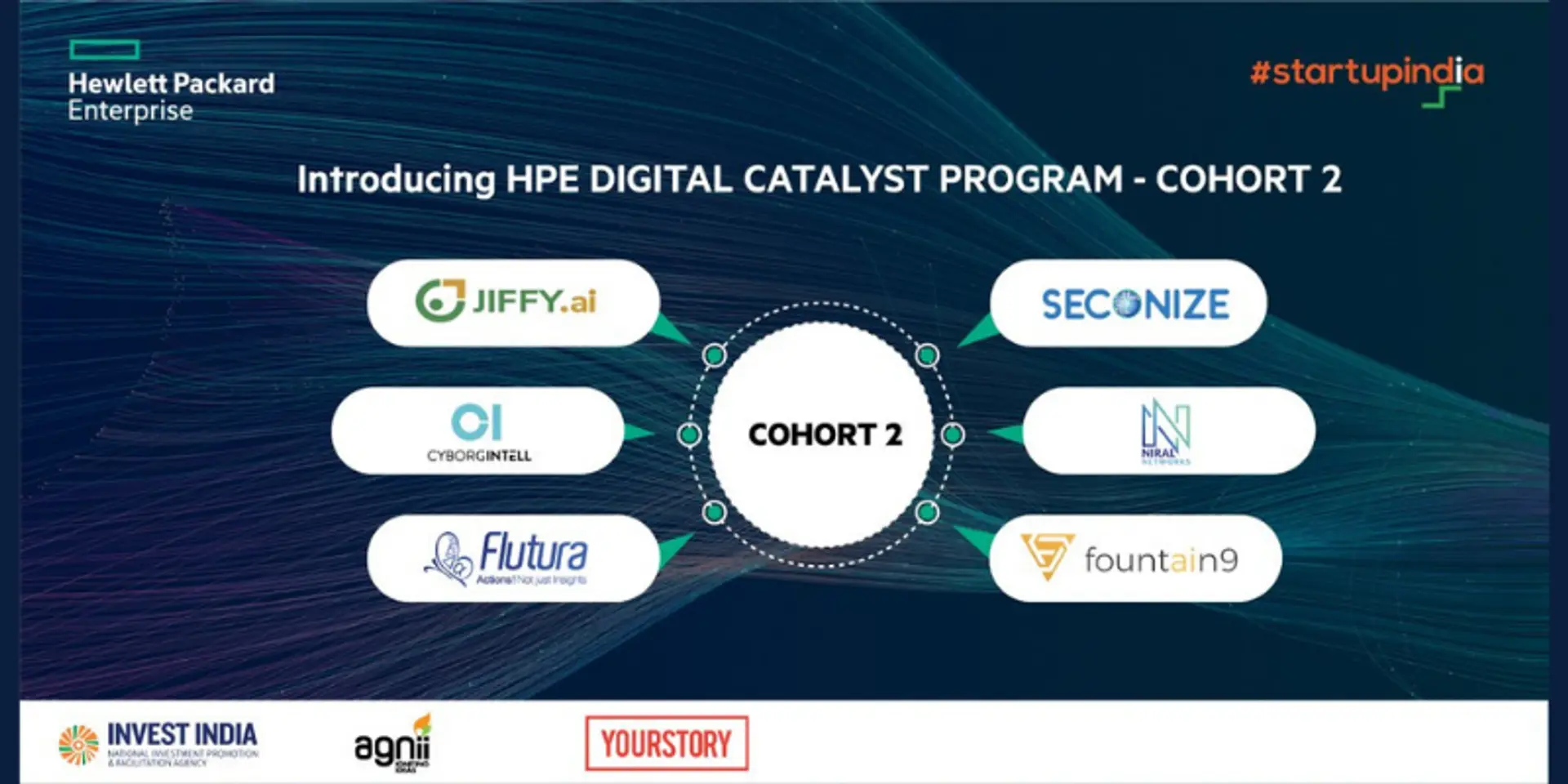
Hewlett Packard Enterprise HPE
View Brand PublisherCohort 2 of HPE Digital Catalyst Program demo deeptech solutions at the Showcase Event
The HPE Digital Catalyst Program Showcase Event witnessed interesting startup pitches from Cohort 2, insightful keynotes and panels on the importance of startup-corporate partnership in enterprise tech, and more.
The HPE Digital Catalyst Program was launched in 2020 to identify, co-innovate and go to market with the next generation of digital disruptors in the Indian startup ecosystem. The HPE team works with startups in four focus areas - Artificial Intelligence, DevSecOps, Cybersecurity and Intelligent Edge in three main verticals - manufacturing, finance and telecom.
This year, the program received 300+ applications, out of which six startups were chosen through a rigorous curation process. They are Jiffy.ai, CyborgIntell Private Ltd, Niral Networks, Seconize, Fountain9, and Flutura Decision Sciences and Analytics. The selected startups received support with technology, go-to-market (GTM), and investment.
A virtual Showcase Day was held on January 20, 2022, where the startups got a chance to showcase their innovative joint solutions to eminent industry leaders, investors, ecosystem enablers, and innovators.
Focus on innovation and partnership
Known for its legacy of innovation, HPE believes in the power of partnership to solve its customers' most challenging problems. It is with this foundational belief that the HPE Digital Catalyst Program was launched.
Sharing about the vision of the program, Cynthia S Srinivas, VP - Software Engineering and India R&D Site Lead, HPE said, "Entrepreneurship is an embodiment of courage, perseverance, risk-taking, leadership, passion, hardship and failure before attaining the elusive milestone of success. We tried to design the program with a startup-first mindset, to create value for startups by leveraging the unique strengths of HPE. We're very excited about the future of our collaboration with the startup ecosystem in India."
Som Satsangi, Managing Director, HPE India added that many enterprises started digitising as a knee jerk reaction to meet the unprecedented challenges of the COVID-19 pandemic. But now it’s a more strategic response with digitalisation and automation becoming a long-term objective for most organisations.
"HPE Digital Catalyst Program is our effort to connect path-breaking innovations driven by the vibrant Indian startup ecosystem with the digital needs of our enterprise customers. The reason we chose the finance, manufacturing, and telecom sector is so that every segment in India gets an affordable new set of solutions that meet the mass requirement," he said.
Panel: Co-creating the future of enterprise tech
The event also hosted a panel to discuss how startups and corporations can work together to accelerate technology innovation. The panel featured Mike Woodacre, HPE Fellow, CTO HPC/MCS, HPE; Sameer Brij Verma, Managing Director, Nexus Venture Partners; Ganesh Gopalan, CEO and Co-founder, gnani.ai; and was moderated by Madanmohan Rao, Research Director, YourStory Media.
Sameer, being one of the most prolific investors in the enterprise tech space in India, said that when you're building an enterprise company, it's important to know the voice of your customers and large corporations provide a great platform to do that. "Large companies act as strong propagators of your technology and product into the market. But only after you get your product-market fit should you consider a go-to-market partnership. Before that, engage with platforms like HPE Digital Catalyst Program to get insights from the corporate’s eye and emulate that while building your products."
As a founder of an enterprise tech startup, Ganesh said that there are benefits for large corporations in terms of tech talent and forward-thinking ideas from young entrepreneurs. On the other hand, while accelerators are great for knowledge, startups should only use them as a sounding board to brain-pick new ideas. "Once you have product-market fit, go for it. Partner with a specific business for a specific product area to add value to end customers," he said.
Mike spoke about how over the years, HPE has invested in India and specifically in Bengaluru for engineering. "Three years ago, we thought of creating a programme to work with the startup ecosystem and tailor our Pathfinder initiative for India. With India leading the scale of innovation and developers, we feel this is a great opportunity to partner with them to accelerate the impact and solve our customer's problems with solutions that we can't create on our own," he said.
What deeptech startups should prioritise
Bringing in the startup perspective, Manish Jethani, Co-founder, CEO, Hevo Data shared his learnings at the event. According to him, early-stage startups tend to quickly build and scale. But when it comes to deeptech, identifying the ideal customer profile (ICP) is the most important factor. "Identify the user, what a day in their life looks like, and the challenges they face. If you get this inaccurate, it could cost you more years to reach the final destination," he said.
He added that a lot of people advise startups to get to 1 million ARR quickly, but because they're not scientific or systematic about it, they don’t succeed. "If you reach the first 1 million the right way instead of hacking your way there, the journey from 1 to 10 million will be easier and predictable.”
Meet the startups from Cohort of 2021
1. Jiffy.ai - An app-based AI and ML-powered automation suite to boost productivity, transform processes, and drive innovation.
2. CyborgIntell Private Ltd - An enterprise AI company that helps organisations rapidly develop, deploy, and operationalise AI applications at scale.
3. Niral Networks - The company is building curated, open, and disaggregated networking solutions for private 5G and beyond.
4. Seconize - Seconize DeRisk Center is an automated and continuous IT risk and compliance management SaaS product that proactively identifies weak points in the enterprise IT infrastructure, prioritises the risks based on the impact so that optimal investments can be made to minimise exposure.
5. Fountain9 - An AI-powered demand sensing and inventory optimisation solution helping companies cut down on stock losses and inventory pileups.
6. Flutura Decision Sciences & Analytics - An industrial AI company that helps operate large-scale industrial facilities reliably to achieve the best operational performance sustainably.
Closing the event, Chandrashekhar Raman, Lead - HPE Digital Catalyst Program, HPE, said, "As the HPE Digital Catalyst program grows and evolves, we're trying to strengthen and further accelerate solution development by creating collaborative workspaces and infrastructure sandbox so that we have a more structured approach for our GTM and tech partnership."







